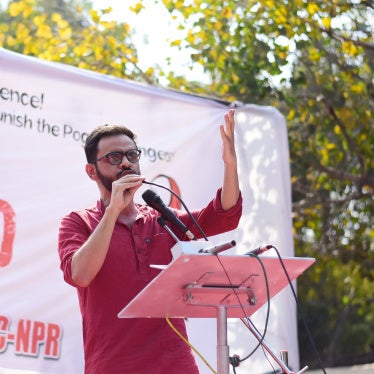Human Rights Watch today called on the heads of state of India and Pakistan to focus on restoring civil liberties, accountability, and justice in Kashmir.
The summit between Indian Prime Minister Atal Behari Vajpayee and Pakistani President General Pervez Musharraf will take place in Agra on Sunday, July 15.
"Respect for human rights must be at the center of any effort to resolve the conflict," said Sidney Jones, executive director of the Asia division of Human Rights Watch. "The cycle of repression and violence will only escalate unless there is a commitment by all parties to end human rights violations."
Human Rights Watch pointed to the absence of human rights guarantees as a critical omission in the unilateral ceasefire that was declared by Prime Minister Vajpayee on November 19, 2000. The ceasefire was lifted on May 23, 2001. Shortly after the ceasefire's imposition, the state police chief in Jammu and Kashmir, A.K. Suri, announced that the ceasefire would not affect police counterinsurgency operations. Arbitrary arrests and custodial deaths continued to be widely reported while the ceasefire was operative.
The violations have been compounded by a lack of accountability for abuses committed by Indian security personnel in Kashmir. More than two months have passed since the beating of seventeen journalists by troops of the Indian Border Security Force (BSF) in Magam. The officers implicated were subsequently recalled from Kashmir, but no disciplinary action appears to have been taken against them. The assault took place on May 10, while the journalists were covering a suicide bomb attack against a BSF camp. An official inquiry was promptly conducted by BSF Inspector General (Operations) Vijay Kumar, but the resulting report has not been made public, despite requests from local journalists and journalists groups. The journalists concerned have also not been compensated for the extensive damages sustained to their photographic equipment.
Both India and Pakistan have continued to deny political rights and to restrict freedoms of expression and assembly in the sectors of Jammu and Kashmir that they respectively control. India yesterday placed Kashmiri leader Shabbir Shah under house arrest, on the eve of the summit and on the day of a procession that he planned to lead commemorating the shooting of some twenty-two unarmed Kashmiris by troops of the state's former ruler in 1931.
Pakistan last week barred twenty-five candidates from the Jammu and Kashmir Liberation Front (JKLF) from contesting assembly elections in the Pakistan-held portion of the state, after they refused to sign a declaration pledging their support for the accession of Jammu and Kashmir to Pakistan. Several dozen JKLF supporters were arrested during protests over the elections, including JKLF chief Amanullah Khan.







